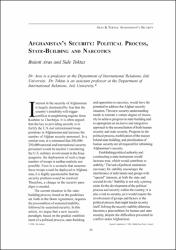Afghanistan's security: Political process, state-building and narcotics
Künye
Aras, B. & Toktaş, S. (2008). Afghanistan's security: Political process, State‐Building and narcotics. Middle East Policy, 15(2), 39-52. doi:10.1111/j.1475-4967.2008.00348.xÖzet
Establishing political authority and constructing a state instrument would increase trust, which would contribute to stability.1 The lack of political institutions necessary for stability encourages the interference of individuals and groups with "special" interests, at both the state and societal levels.2 Stability is not only a prerequisite for the development of the political process and security within the country; it is also a risk to security, as it would require the involvement of groups and factors in the political process that might hinder security itself. [...] in a setting where fierce security measures are needed, running security operations without supplying adequate security personnel and munitions is an absolute risk.48 CONCLUSION The long-term objective for Afghanistan is to strengthen the state structurally and to set mechanisms in place that would prevent it from working only for narrow or factional interests.


















